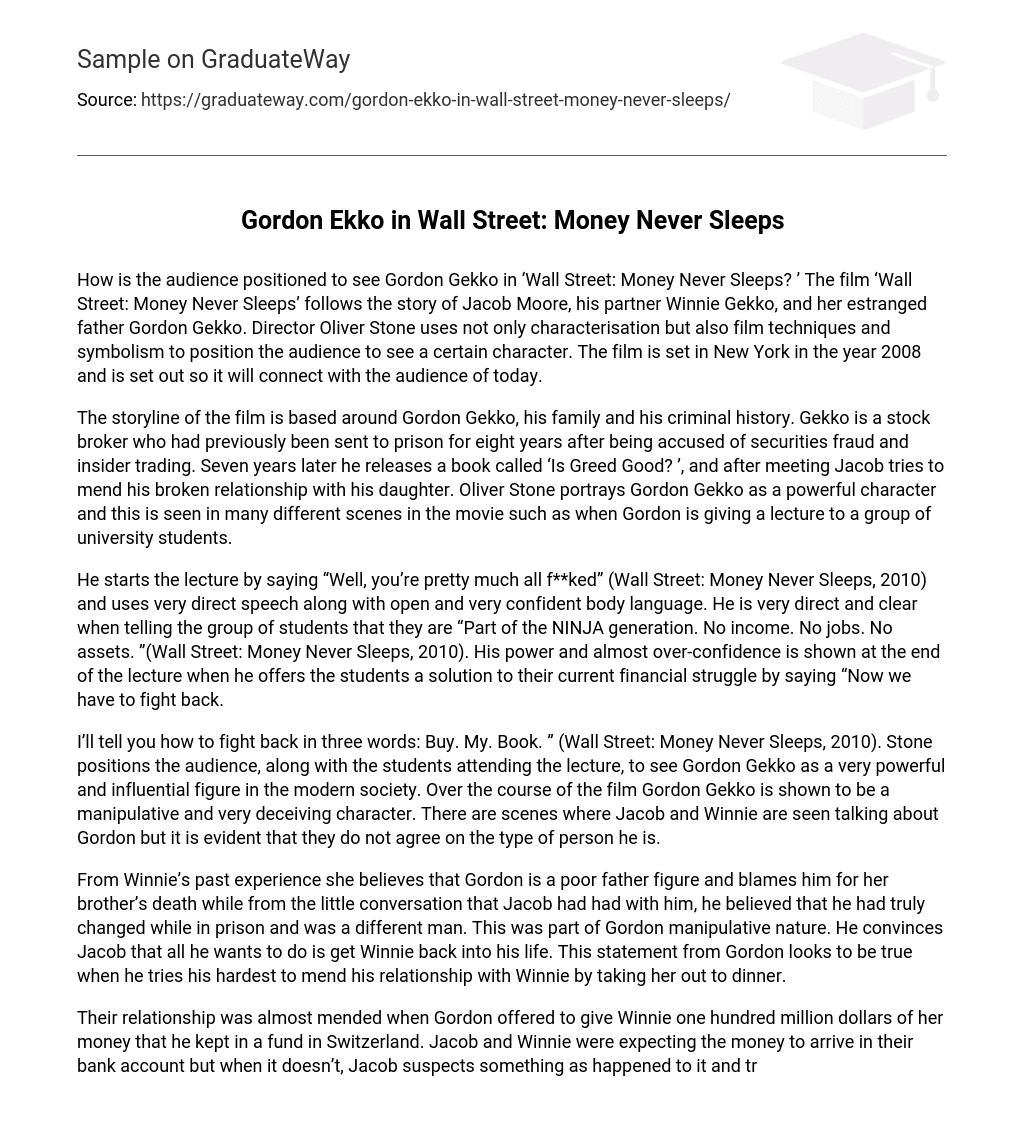In ‘Wall Street: Money Never Sleeps’, the audience’s perspective of Gordon Gekko is shaped through character development, film techniques, and symbolism. The movie follows Jacob Moore, his partner Winnie Gekko, and her distant father Gordon Gekko in New York during 2008. Director Oliver Stone aims to establish a connection with today’s viewers by utilizing these elements to influence how the audience perceives a particular character.
The focus of the film revolves around Gordon Gekko, his family, and his history of criminal activities. Gekko, who worked as a stock broker, was imprisoned for eight years due to committing securities fraud and insider trading. After serving seven years in prison, he writes a book called ‘Is Greed Good?’ and tries to mend his relationship with his daughter by connecting with Jacob. In several scenes throughout the movie, director Oliver Stone portrays Gordon Gekko as a powerful figure, particularly when he gives a lecture to college students.
Beginning his lecture with blunt language and confident body language, the speaker declares, “Well, you’re pretty much all f**ked” (Wall Street: Money Never Sleeps, 2010). He directly addresses the group of students, describing them as part of the NINJA generation with “No income. No jobs. No assets.” (Wall Street: Money Never Sleeps, 2010). At the conclusion of the lecture, he displays his power and self-assurance by offering a solution to their financial hardships with the statement, “Now we have to fight back.”
In three words, Stone suggests fighting back by purchasing his book (Wall Street: Money Never Sleeps, 2010). Through the film, Stone portrays Gordon Gekko as a highly influential and powerful figure in society, positioning the audience and lecture attendees to perceive him as such. Throughout the movie, it becomes evident that Gordon Gekko is manipulative and deceptive. Jacob and Winnie discuss Gordon, but their opinions on his character differ.
According to Winnie, Gordon is perceived as a negligent father and is held responsible for her brother’s death. However, Jacob, after a brief conversation with Gordon, believes that he has genuinely transformed during his time in prison and is now a different person. Gordon’s manipulative nature becomes evident as he convinces Jacob that his only intention is to reconcile with Winnie. This claim seems to be supported by Gordon’s efforts to rebuild his relationship with Winnie by taking her out to dinner.
Despite their damaged relationship, Gordon offered to give Winnie one hundred million dollars from her Swiss fund to mend their ties. Jacob and Winnie anticipated the money in their bank account, but when it failed to arrive, Jacob suspected foul play and began searching for Gordon. Eventually, Jacob finds Gordon living in London. During their confrontation, Gordon tries to justify taking the money by explaining how betrayed he felt when Winnie didn’t visit him in jail, stating, “They took my life. And when I got out, who was waiting for me? Nobody!” (Wall Street: Money Never Sleeps, 2010). Jacob simply retorts, “You’re a sad man, Gordon” (Wall Street: Money Never Sleeps, 2010). The character of Gordon Gekko undergoes significant changes throughout ‘Wall Street: Money Never Sleeps’ (2010), exemplified by various scenes. After rejecting Jacob’s proposal to return their money in exchange for a grandchild, Gordon is shown deep in thought while sitting in his office chair.
Gordon is observing the flickering stock numbers on his screen, but he switches to watching a video of his unborn grandson. From the perspective behind Gordon, it is evident in his reflection that he is pondering his decision. Subsequently, he reconsiders Jacob’s proposition and seeks forgiveness from Winnie, resulting in a transformation in their relationship. In the movie ‘Wall Street: Money Never Sleeps’ (2010), filmmaker Oliver Stone positions the audience to perceive Gordon Gekko as both affluent and immensely influential, yet also as a character aspiring to change himself for a better future.
In the movie, Gordon is depicted as a dominant and powerful character while talking to Jacob and the university students. However, when speaking with Winnie, their power dynamics appear to be equal. Throughout the film, a theme of change is demonstrated as the relationship between Winnie and Gordon is repaired. Stone also employed film techniques to illustrate Gordon’s evolving behavior upon seeing his unborn grandson.





